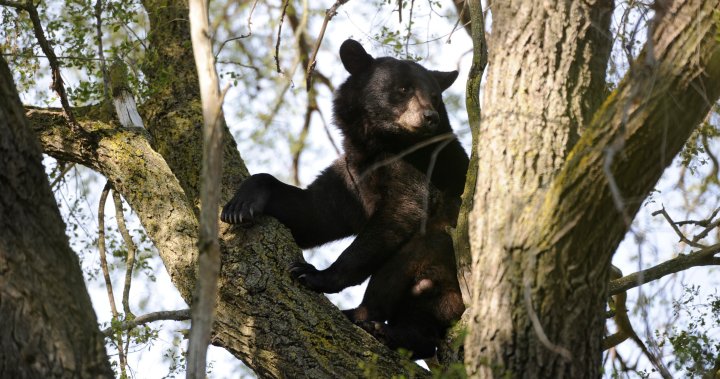An unpredictable and often mild winter in Ontario could be behind the early emergence of black bears from hibernation in some parts of Ontario.
Wildlife experts, police and government are all urging people who live in or visit bear country to be extra careful with food as the signs of early spring fill the air.
“With this winter’s mild weather and lack of snow, there have been reports of black bears coming out of hibernation early in some parts of the province,” the Ministry of Natural Resources and Forestry said.
Between December and March in an average year, Ontario records roughly 12 sightings of black bears. The province said it has already received 18 sightings during the same time this year.
Global News’ chief meteorologist Anthony Farnell said Canada has experienced a “wild” winter, with deep freezes swinging into temperatures in the mid-teens.
Unusually warm weather has also brought the first signs of spring, he said.
“When it’s warmer than normal, like it has been, we’re going to get the buds and the flowers coming out early,” Farnell said. “Then all it takes is some cold temperatures in April for things to really go haywire.”
One of the reasons for the unexpected early appearance of black bears can be attributed to melting snow, one expert said.
Breaking news from Canada and around the world
sent to your email, as it happens.
Mike McIntosh, the founder of the charity Bear With Us, said snow melting can drip into the spaces bears are sleeping in and force them outside. When their hibernation space gets wet, bears will then move to find a place in the sun to sleep.
Bears coming out early, McIntosh said, isn’t necessarily a bad thing, but unwatched food can cause problems. Bears generally don’t start to eat until around late April, when they would naturally feed on grass and buds.
“(Many people think) bears come out of their den hungry. That’s not the case,” he said.
That natural process can be affected if bears come across high-calorie food either in garbage or in the form of bird feeders. McIntosh said a key rule for anyone living in an area that might be accessible to bears is to remove feeders when the snow melts.
“At this time of year, there is little natural food for bears, causing them to search for other food sources, such as garbage and bird feed, in more populated areas,” the Ministry of Natural Resources said.
The province and Ontario Provincial Police have both urged people to keep food and garbage away from bears.
They said bears are not necessarily a threat but if one does “pose an immediate threat” and is showing signs of aggression, call 911.
Bear sightings can also be reported to the province’s non-emergency, toll-free Bear Wise line at 1-866-514-2327.
© 2024 Global News, a division of Corus Entertainment Inc.




